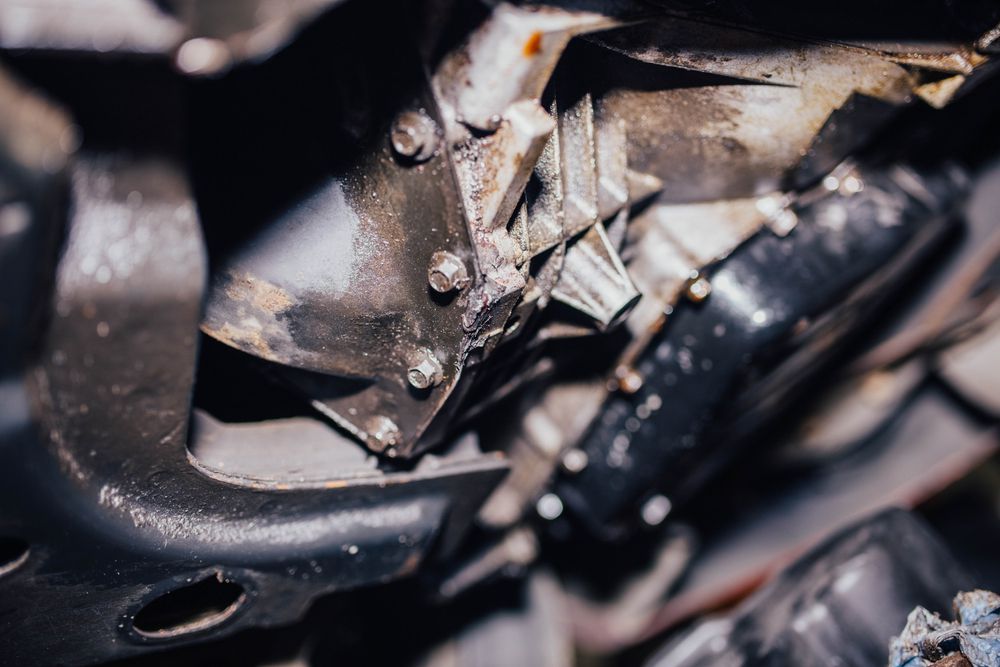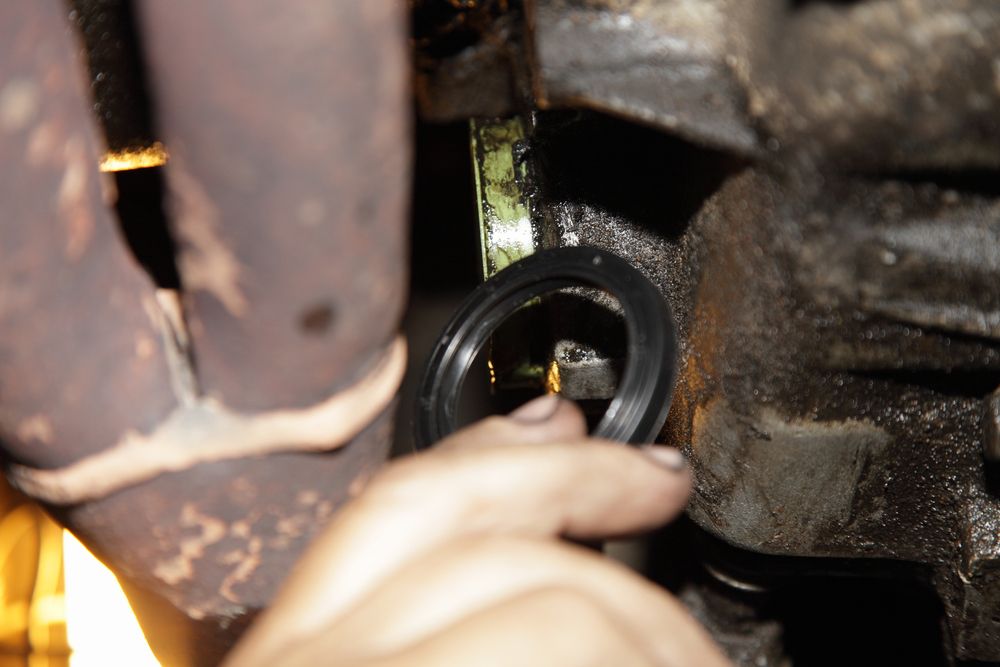A transmission is the critical part of a vehicle's drivetrain that converts the engine's high speed down to a lower speed and higher torque more appropriate to the vehicle's drive axle(s) depending on the driving scenario.
If the fluid level in a transmission is low, but you can't find any obvious leaks, it's most likely because the leak is small and leaking too slowly to notice or because the transmission only leaks while you are driving.
Transmission fluid, also known as transmission oil, lubricates, dissipates heat, and, in automatic transmissions, activates mechanisms within the transmission. If the transmission fluid is low, your transmission will not function properly, and catastrophic damage could occur.
 Transmission leaking oil
Transmission leaking oil
Can You Lose Transmission Fluid Without a Leak?
If you're worried that your transmission is losing fluid but cannot find a leak, it probably does have a leak, and you just can't see it.
Your vehicle's transmission is completely separate from the combustion process; therefore, no fluid should be burning away.
This doesn't mean that the transmission is safe from road damage and heat from the engine.
Why am I Losing Transmission Fluid?
A damaged seal or gasket is the most common cause of a transmission fluid leak.
As your vehicle ages, the seals and gaskets that keep transmission fluid in place can wear down and crack, leading to small leaks.
Additionally, suppose your car experiences a lot of stop-and-go traffic or is frequently driven in hot weather.
In that case, the transmission fluid can begin to break down, leading to micro-leaks that are near impossible to spot with the naked eye.
Like an engine oil pan, a transmission's oil pan holds the transmission fluid when it is not being circulated through the transmission.
The transmission pan has a gasket where it mates with the transmission. The gasket tends to leak on older vehicles. A transmission pan leak is usually worse when the vehicle is in operation.
There are also drive shaft seals at the back of a rear-wheel-drive vehicle and front transmission seals that can leak.
 Rear drive shaft seal
Rear drive shaft seal
Alternatively, you could have a faulty vacuum modulator.
The vacuum modulator is a control valve that regulates the amount of vacuum pressure applied to the diaphragm in the modulator.
This controls the amount of fluid allowed to pass through the modulator and thus the amount of pressure applied to the transmission.
If damaged, your transmission will not get the appropriate amount of fluid and could begin leaking.
Is it Normal for Transmission Fluid to Get Low?
Transmission fluid levels can drop over time due to leaks or normal wear and tear.
While it is not unusual for transmission fluid to get low, it is important to keep an eye on the level and top it off when necessary.
If you suspect that your transmission fluid is starting to drop, it is an indication that a seal or gasket is damaged n and that your vehicle needs some maintenance.
As long as the transmission is still working, you can continue driving, but we recommend getting it fixed as soon as possible.
Does Transmission Fluid Evaporate Over Time?
Transmission fluid doesn't just disappear.
Your vehicle's transmission is a tightly contained system that shouldn't be exposed to the open air.
If you're losing fluid, it's not because it's dissipating away but because it's leaking.
Some transmissions are considered closed or completely sealed and lack a dipstick.
If your vehicle falls into this category, the only reason you could lose fluid is if there's a leak.
Low Transmission Fluid Symptoms?
If you think your transmission fluid is low, there are a few symptoms to look out for.
The most common symptom is a transmission that slips or hesitates when shifting gears. If the transmission fluid is low, it can't lubricate the gears properly, causing them to slip.
Another common symptom of low transmission fluid is a delay in response when you press the gas pedal.
If it takes longer than usual for your car to accelerate, it may be due to low transmission fluid.
Finally, if your car's transmission is making unusual noises, such as whining, humming, or grinding, it may indicate that the fluid is low.
If you notice any of these symptoms, we recommend checking the transmission fluid level as soon as possible.
Will Transmission Slip if Low Fluid?
If your transmission fluid is low, it can't lubricate the gears properly, causing them to slip.
This can happen when you're shifting gears or when you're accelerating.
Slipping gears can cause the engine to rev without the car actually moving, which can be dangerous.
Additionally, if the transmission fluid is low, it can cause the transmission to overheat.
This can lead to even more serious problems, such as a blown transmission.
For these reasons, it's important to keep an eye on the transmission fluid level and top it off when necessary.
How Far Can I Drive On Low Transmission Fluid?
If your transmission fluid is low, it's best to add more as soon as possible.
However, if you're in a bind and can't get to a service station immediately, you can continue driving for a short distance.
We recommend driving no more than 30 miles before adding more fluid.
Remember that driving with low transmission fluid can cause the transmission to slip or hesitate when shifting gears.
Additionally, it can cause the transmission to overheat, leading to even more serious problems.
For these reasons, adding more fluid as soon as possible is best.
Conclusion
Transmission fluid is essential for the proper functioning of your vehicle's transmission.
If your vehicle is losing fluid, it's likely due to a small leak you cannot see. Usually, the leak will be from the transmission pan gasket.